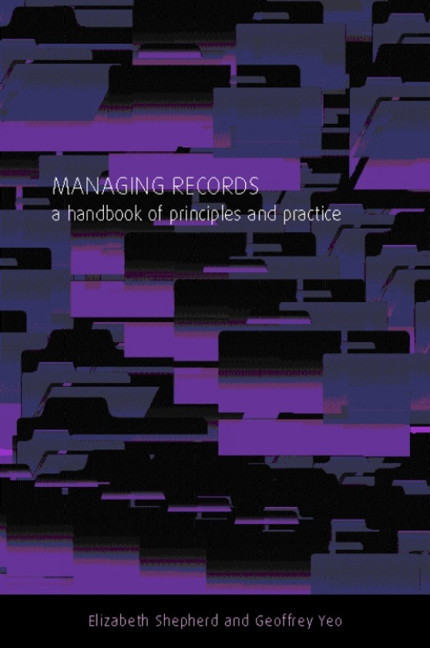Book contents
- Frontmatter
- Contents
- Preface
- Editorial note
- Introduction
- 1 Understanding records management
- 2 Analysing the context for records management
- 3 Classifying records and documenting their context
- 4 Creating and capturing records
- 5 Managing appraisal, retention and disposition
- 6 Maintaining records and assuring their integrity
- 7 Providing access
- 8 Implementing records management: practical and managerial issues
- Conclusion
- Appendix A Bibliography and sources of further information
- Appendix B Select list of national and international standards
- Appendix C Professional organizations for records managers in English-speaking countries
- Index
6 - Maintaining records and assuring their integrity
Published online by Cambridge University Press: 09 June 2018
- Frontmatter
- Contents
- Preface
- Editorial note
- Introduction
- 1 Understanding records management
- 2 Analysing the context for records management
- 3 Classifying records and documenting their context
- 4 Creating and capturing records
- 5 Managing appraisal, retention and disposition
- 6 Maintaining records and assuring their integrity
- 7 Providing access
- 8 Implementing records management: practical and managerial issues
- Conclusion
- Appendix A Bibliography and sources of further information
- Appendix B Select list of national and international standards
- Appendix C Professional organizations for records managers in English-speaking countries
- Index
Summary
A fundamental element of records management is ensuring that records remain secure, intact, accessible and intelligible for as long as they are needed. This chapter considers the strategies that are required to maintain the integrity of records over time.
With paper records, the main emphasis is on storing the physical media and protecting them from loss or damage. Electronic records require a different approach: the physical carriers are likely to be short-lived, but the records must be maintained over time and probably across several generations of storage media. While preservation of paper records is costly in terms of space occupancy, electronic storage media are compact and relatively inexpensive but costs are incurred in ensuring that records remain accessible.
Storage systems for paper records
Centralized or decentralized?
Storage of records can be centralized or decentralized. In a fully centralized system, records for the whole organization are stored together. A central store offers a high degree of control and security, and optimizes the use of space by employing bulk storage equipment. In a decentralized system, records are held closer to where users work, but controls may be more difficult to achieve.
Some organizations centralize all their paper records storage, but this is increasingly rare. More often, following the lifecycle model in Figure 1.2 (page 6), decentralization of some or all current records is combined with a centralized facility for records deemed to be semi-current or non-current.
Most organizations recognize that standard procedures and access controls for paper records are easier to enforce in a centralized system, where specialist records staff can be employed; but when records are required frequently or urgently the convenience of local access usually takes priority and decentralization is preferred. Current records are likely to have high referral rates. Records that have passed beyond the current stage are rarely required at very short notice, so local accessibility is less important.
Besides speed of access, decentralization provides a sense of ownership by records creators and users. Decentralized storage is often the day-to-day responsibility of the business units where records are created, as central records staff rarely have the resources to service decentralized paper files. In some organizations the central records manager may not be expected to have any participation in the management of decentralized systems.
- Type
- Chapter
- Information
- Managing Recordsa handbook of principles and practice, pp. 173 - 215Publisher: FacetPrint publication year: 2003



